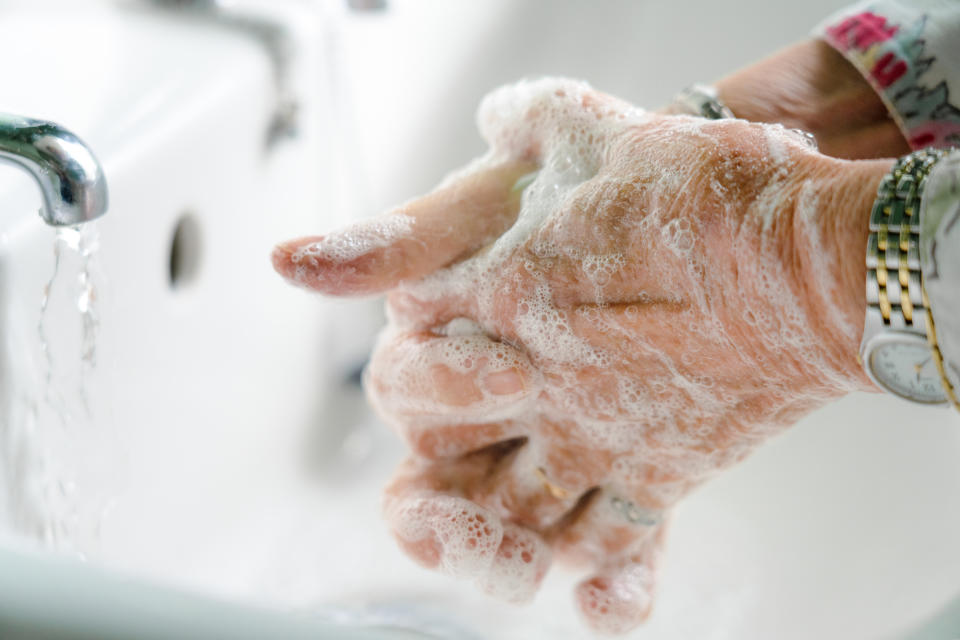Virus that causes COVID-19 can live on your skin for 9 hours, study finds. Here's what kills it in under 20 seconds.
Research has determined how long the coronavirus, which causes COVID-19, can live on a variety of surfaces, like cardboard, plastic and metal. And now, a new study has determined exactly how long it can live on your skin.
The study, which was published in the journal Clinical Infectious Diseases, evaluated the stability of SARS-CoV-2 (the scientific name of the coronavirus) and the influenza A virus, mixed with a culture medium or upper respiratory mucus, on human skin surfaces.
The researchers found that the coronavirus can live on the skin for a “significantly longer” amount of time than the flu. Specifically, SARS-CoV-2 lived on skin for more than nine hours, while the influenza A virus lived on skin for less than two hours.

But the researchers also discovered that SARS-CoV-2 and influenza A were “completely inactivated” within 15 seconds after being treated with 80 percent ethanol, a common ingredient in hand sanitizers.
“The 9-hour survival of SARS-CoV-2 on human skin may increase the risk of contact transmission in comparison with influenza A virus, thus accelerating the pandemic,” the researchers concluded. “Proper hand hygiene is important to prevent the spread of SARS-CoV-2 infections.”
The Centers for Disease Control and Prevention recommends that people use soap and water to prevent the spread of infection, including from the coronavirus. However, the CDC says, when soap and water aren’t readily available, an alcohol-based hand sanitizer that contains at least 60 percent alcohol can also help clean your hands.
To use hand sanitizer properly, the agency recommends putting enough of the product on your hands to cover all the surfaces and rubbing your hands together until they feel dry, usually for about 20 seconds.
But while the CDC recommends that hand sanitizers contain at least 60 percent alcohol, this particular study focused on a much higher concentration, 80 percent alcohol. That doesn’t mean hand sanitizers with lower alcohol concentrations are worthless, though, Dr. Amesh Adalja, senior scholar at the Johns Hopkins Center for Health Security, tells Yahoo Life.
“Lower concentrations work,” he says. “They just may take more time. Soap and water work as well.”
Dr. Rajeev Fernando, an infectious disease expert in Southampton, N.Y., agrees. “We know the CDC recommends 60 percent to 95 percent alcohol in hand sanitizers for COVID-19,” he tells Yahoo Life. But, he adds, “it would’ve been interesting to see the study results if the researchers used 60 percent [ethanol] in the study. We need more studies on this.”
It’s important to note that this study was conducted in a lab setting, which is different from being out in public, where skin might rub against other surfaces and be cleaned often, Dr. William Schaffner, an infectious disease specialist and professor at the Vanderbilt University School of Medicine, tells Yahoo Life. “The findings are not surprising, particularly in a laboratory circumstance,” he says. “Human skin is a friendly place for a virus such as COVID-19.”
Currently, the CDC says that COVID-19 is spread mostly through exposure to infected respiratory droplets, as well as through airborne transmission. But it says the virus spreads “less commonly” through contact with contaminated surfaces.
Adalja says the latest findings aren’t shocking. “We’ve known that people can transmit this on their hands when they touch their face and other people,” he says. “That’s why we advocate for washing your hands regularly.”
Schaffner says the study only underscores the importance of regular hand cleaning. “The important thing is that hand sanitizer works. It will work at 60 percent alcohol too,” he says. “This just reemphasizes the importance of hand hygiene.”
For the latest coronavirus news and updates, follow along at https://news.yahoo.com/coronavirus. According to experts, people over 60 and those who are immunocompromised continue to be the most at risk. If you have questions, please reference the CDC’s and WHO’s resource guides.
How to maintain your physical and mental health during the pandemic
Taking care of a loved one with COVID-19? Here’s how to stay healthy.
Q&A with Dr. Kavita Patel: How to keep your family safe and maintain your mental health
Read more from Yahoo Life:
Want lifestyle and wellness news delivered to your inbox? Sign up here for Yahoo Life’s newsletter.

